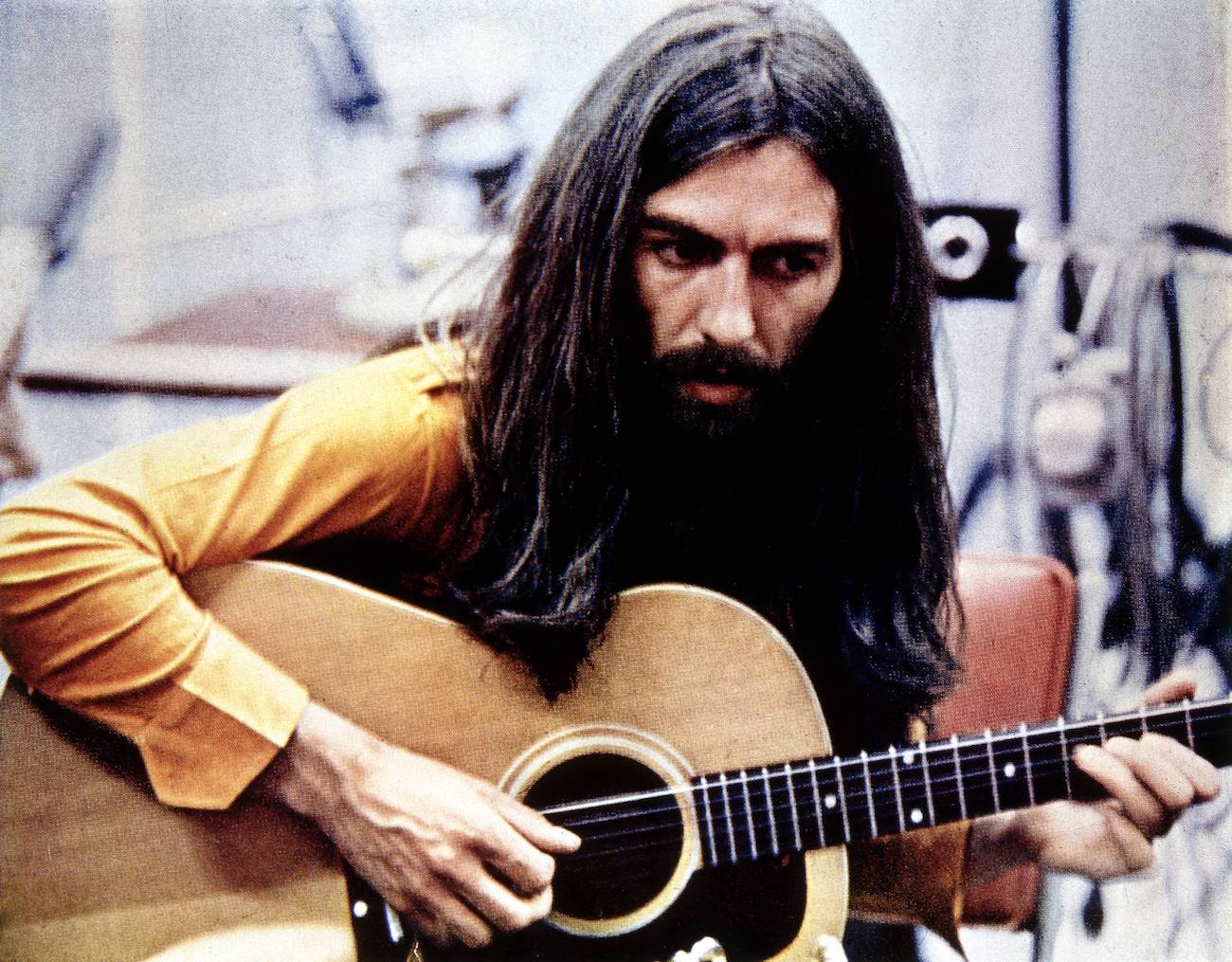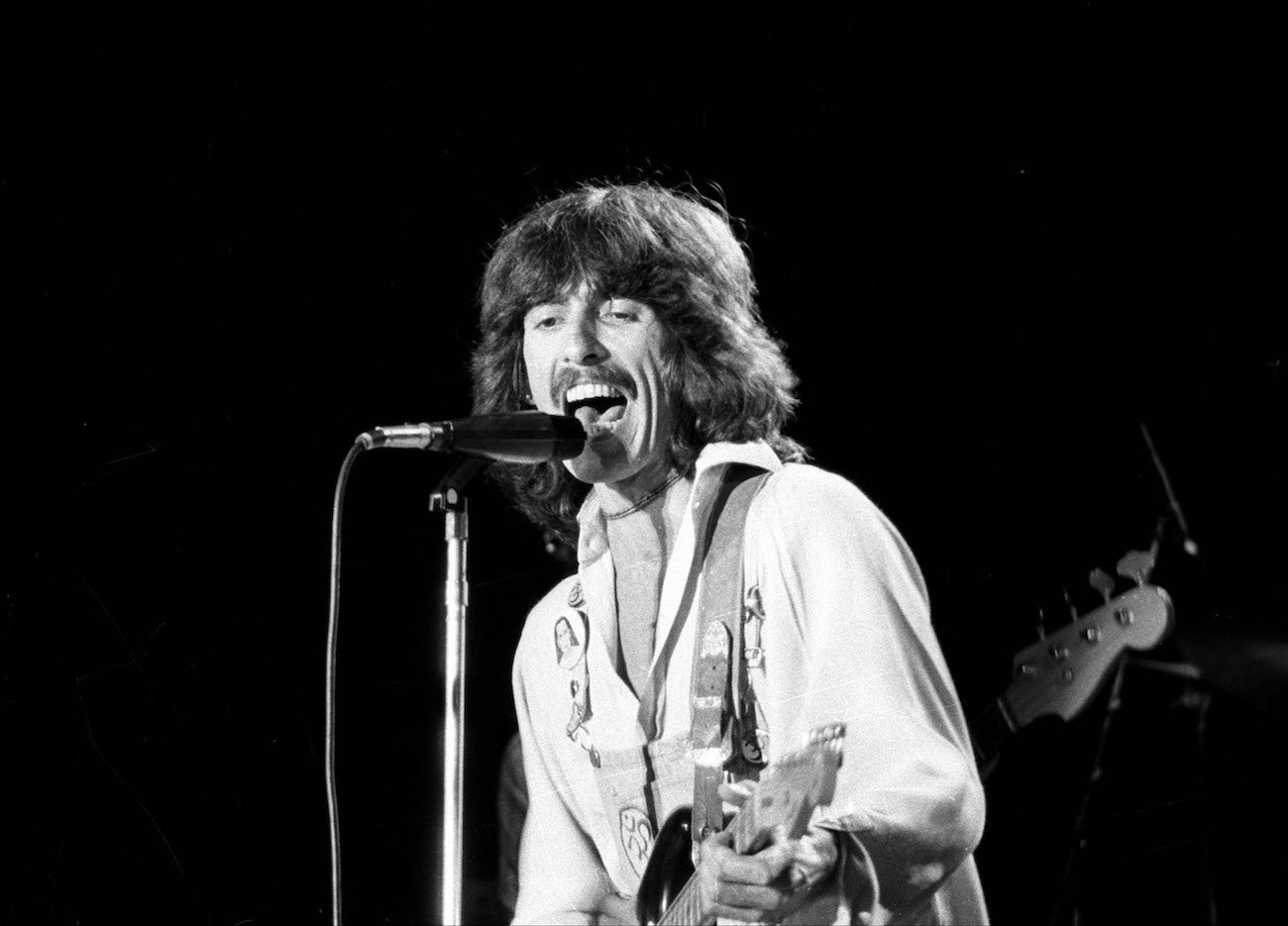
After The Beatles, George Harrison Said His Music Came Across Better Because He Didn’t Care What Anybody Thought
After The Beatles split in 1970, George Harrison became less conscious of what people thought of his music. He had more confidence in his songs, and consequently, they came across better for him.

George Harrison wasn’t confident about his music in The Beatles
In the early days of The Beatles, John Lennon and Paul McCartney appointed themselves the chief songwriters. Neither George nor Ringo Starr ever showed interest. However, that changed.
In 1992, George told Guitar World that he didn’t initially think about writing songs. “To get it straight, if I hadn’t been with John and Paul I probably wouldn’t have thought about writing a song, at least not until much later,” George explained. “They were writing all these songs, many of which I thought were great. Some were just average, but, obviously, a high percentage were quality material. I thought to myself, ‘If they can do it, I’m going to have a go.'”
In 1963, George experimented to see if he could write a song as good as his bandmates. The result was “Don’t Bother Me.” However, it complicated the group’s dynamic once George started writing more. John and Paul turned most of them down and gave him a two or three-song quota per album.
Despite receiving no encouragement from his bandmates, George began writing tons of songs, and they mounted up. George wasn’t releasing them fast enough, but he wasn’t confident to push. George told WABC-FM New York’s Howard Smith (per Beatles Interviews), “It was the way the Beatles took off with Paul and John’s songs, and it made it very difficult for me to get in.
“And also, I suppose at that time I didn’t have as much confidence when it came down to pushing my own material as I have now. So it took a while. It was whoever would be the heaviest would get the most songs done. So consequently, I couldn’t be bothered pushing, like, that much.”
George was happy with his position in the band, but that didn’t mean it took its toll on his confidence levels. For example, he doubted “Something,” one of his best songs, would sell. In Here Comes The Sun: The Spiritual And Musical Journey Of George Harrison, Joshua M. Greene wrote that George’s first wife, Pattie Boyd, was accustomed to such insecurities.
“As long as she had known him, he had been an enigma, sometimes exuding self-confidence, sometimes doubting whether he could do anything right,” Greene wrote.
“When they met, he had invoked in her, as he had in thousands of young women and men, the excitement of superstardom. It seemed unthinkable back then that beneath the glory there lived someone with such doubts about himself. The psychology of the human being was so much more complex than his image.”
“I had a little encouragement from time to time [for songwriting], but it was very little,” George told Crawdaddy in 1977 (per Beatles Interviews). “It was like they were doing me a favor. I didn’t have much confidence in writing songs because of that.”
George said his music came across better because he didn’t care what anyone thought
Once George left The Beatles, he could release the music he wanted. He could also release no music at all too. George only embarked on a solo career because he had so many songs stockpiled. He said he wouldn’t have been able to move forward without releasing them.
So, he compiled a triple album, All Things Must Pass. However, George felt paranoid about those tracks as well. “I remember having those people in the studio and thinking, ‘God, these songs are so fruity!'” George told Crawdaddy. “I can’t think of which song to do.'”
George’s music impressed the musicians. “They’d say, ‘Wow, yeah! Great song!’ And I’d say, ‘Really? Do you really like it?’ Having this whole thing with the Beatles had left me really paranoid,” George said.
Despite what he felt during his time with The Beatles, George’s insecurities seemed to melt away eventually.
During a 1987 interview, a Dutch reporter asked George, “Do you have a feeling that the older you get, the better you become?” George replied, “Yes, for me because when I was younger and with The Beatles, and John and Paul and all that situation was hard for me to come out and get my confidence.
“Now, I don’t care, you know, I’m getting old. I just don’t care about what anybody thinks and consequently, it comes over better.”
George did his best work when he was making music for himself.
George remained carefree
The former Beatle continued to gain confidence through his next couple of albums, although he received negative reviews for his 1974 solo American tour and 1975’s Extra Texture (Read All About It). As much as George claimed he didn’t care what people thought, those reviews bogged him down.
George used to think that being a Beatle was detrimental to his solo career. In 1987, he told E!, “Maybe it’s detrimental having been The Beatles. Sometimes I felt that if I was just like you know, Joe Blow or somebody, and here’s his new album, they’d listen and think, ‘Oh, yeah, that’s pretty good.’ But when they say it’s George Harrison, it’s like, ‘Ah, not him again.’ You know? That kind of thing.”
However, George realized the problem was the record companies, not with being a Beatle. He became disenchanted with them when he recorded 1981’s Somewhere In England. In 1979, he told Rolling Stone that he’d come to hate the “whole thing of when you put it out, you become a part of the overall framework of the business.
“And I was a bit bored with that. If I write a tune and people think it’s nice then that’s fine by me; but I hate having to compete and promote the thing. I really don’t like promotion.”
Because of this, 1982’s Gone Troppo failed to chart in the U.K. It was his only post-Beatles studio album that didn’t chart inside the top 20 in the U.S. Following that, George went on a hiatus for five years and didn’t release another album until 1987’s Cloud Nine, which was enormously successful.
Throughout it all, though, George remained confident in himself and his songs. He hardly read reviews and didn’t care what fans or critics thought. Even his supergroup, The Traveling Wilburys, was carefree.
Ultimately, whether he wanted one or not, George’s music career was riddled with things that tried to divert him off his chosen path, which was to play music how he wanted and connect with God. He had the conviction not to let any diversions affect him.


